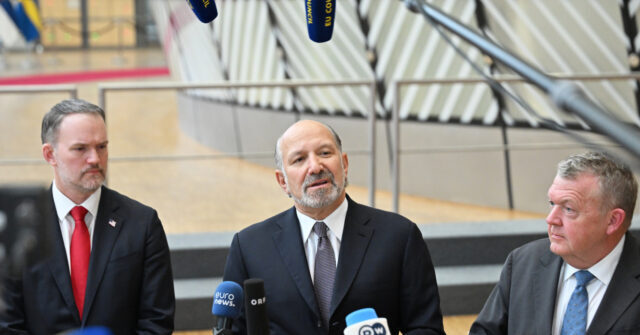On his first official trip to Brussels since the July trade agreement, Lutnick made the administration’s position explicit: any movement on steel and aluminum tariffs—an urgent priority for Europe’s manufacturers—will depend on reforms to the bloc’s digital-regulatory framework and resolution of multibillion-euro cases against U.S. tech companies.
“Our suggestion is that the European Union and their trade ministers deeply consider trying to analyse their digital rules, try to come away with a balance,” Lutnick said at a joint appearance with U.S. Trade Representative Jamieson Greer and EU trade chief Maros Sefcovic.
A person familiar with the discussions said Lutnick told European officials that the bloc’s regulatory system has tilted heavily against American companies.
A Trillion-Dollar Opening—If Europe Changes Course
Lutnick argued that scaling back the EU’s “regulatory chokehold” on U.S. firms could unlock massive investment.
“If they take the foot off this regulatory framework and make it more inviting for our companies, they can get the benefit of hundreds of billions, possibly $1 trillion of investment,” Lutnick told Bloomberg Television. He added that such a shift “would add a point and a half to European GDP,” according to AFP.
The Commerce Secretary pointed specifically to ongoing antitrust actions against firms such as Google, which faces an EU penalty approaching €3 billion.
“Let’s settle the outstanding cases,” Lutnick told Bloomberg. “Let’s put them behind us. Let’s come up with a reasonable framework where these companies can grow and build.”
Washington: EU Digital Rules Target U.S. Firms
The Trump administration has long contended that the Digital Services Act, Digital Markets Act, and related competition rulings impose obligations structured in ways that overwhelmingly ensnare American companies.
Greer noted that the EU’s thresholds “often include” criteria met only by U.S. firms, that compliance “can become challenging,” and that “fines can be quite large,” Bloomberg reported. He also pointed to what he described as “quite aggressive” enforcement.
Lutnick directly linked U.S. tariff policy to the regulatory debate: “In exchange for that, we will come up with a cool steel and aluminum deal,” he told Bloomberg Television.
Europe Under Pressure From Its Own Industry
The issue has grown more acute for European manufacturers since the July trade deal set a fifteen percent baseline tariff on most EU goods. The administration has since widened its fifty percent metals tariffs to include products that contain steel and aluminum, not only the base materials.
“Many machines that have been produced can’t be delivered to the U.S. and our companies are suffering from considerable declines in sales,” German Economy Minister Katherina Reiche told reporters, according to Bloomberg.
EU officials pushed back. A European Commission spokesperson said the bloc maintains its “sovereign right to legislate,” AFP reported, while Sefcovic told Bloomberg the rules are “not discriminatory” and “not aimed at American companies.”
Shared Concerns—But One Non-Negotiable U.S. Priority
The meeting also addressed broader strategic issues, including Chinese overcapacity in steel and vulnerabilities in rare-earth and chip supply chains.
“We didn’t only discuss bilateral issues, but also some of the challenges we are facing together: the overcapacity… China’s role in the global economy and other issues where we have to join forces,” said Danish Foreign Minister Lars Lokke Rasmussen, whose country holds the rotating EU presidency, according to AFP.
But Lutnick’s core message remained unchanged: a stronger transatlantic partnership requires a fair regulatory environment for American technology companies.
For European governments confronting sluggish growth and mounting frustration from their industrial sectors, the choice is now in plain view—maintain the current regulatory path or pursue the investment and economic expansion that Washington says could follow from a reset.
Breitbart News
Read the full article .


